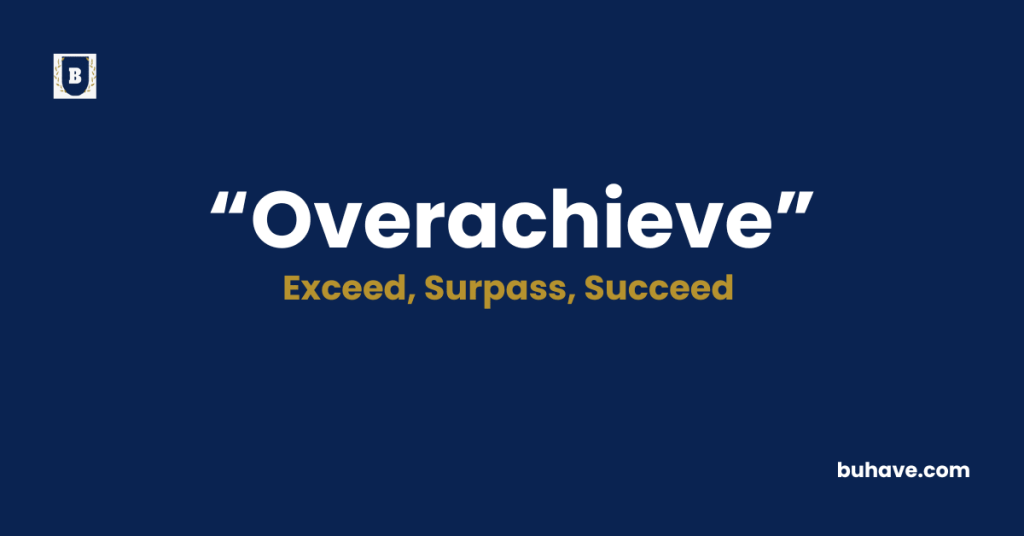The word ‘Overachieve’ (Verb) describes the act of performing better or achieving more than what is expected, often exceeding normal standards or personal limitations. In this guide, you’ll learn the full definition, synonyms, antonyms, etymology, and real-life examples of how to use ‘Overachieve’ correctly in sentences.
Overachieve Explained in Depth
A complete and detailed guide to the word Overachieve including meaning, definition, examples, etymology, synonyms, and antonyms.
Meanings of Overachieve
The word “overachieve” refers to the act of exceeding expectations or accomplishing more than what is typically considered possible or realistic. It’s often used to describe individuals who go beyond the norm in academics, work, sports, or personal goals. Overachievers tend to surpass not only the goals set by others but also their own perceived limitations. They are characterized by ambition, perseverance, and a strong drive to succeed. This word carries both admiration and caution it praises extraordinary success but can also imply undue pressure or the possibility of burnout.
In educational and professional settings, someone who overachieves might consistently outperform their peers, produce exceptional results, or take on more responsibilities than required. While this trait is often celebrated, it can also lead to stress and a relentless pursuit of perfection. Overachievement is sometimes fueled by internal motivation (like a desire to prove oneself) or external pressure (such as expectations from parents, bosses, or society).
Whether it’s an athlete beating a world record or a student maintaining a perfect GPA while juggling extracurriculars, overachieving reflects determination, discipline, and a pursuit of excellence beyond the expected norm.
Definition
Overachieve is a verb that means to perform better or achieve more than expected, especially in academics, work, or personal performance. It involves exceeding the standard level of success through exceptional effort, talent, or determination.
When someone overachieves, they often surprise others with their accomplishments. This could be a student from a disadvantaged background excelling in school, an employee rising quickly through the ranks, or someone mastering a new skill with incredible speed. It’s not limited to natural talent—it frequently results from hard work, consistent effort, and a strong mindset. People who overachieve usually set high personal standards and are not satisfied with simply meeting the minimum requirements. They aim to go above and beyond in every area of their lives. While this mindset is often admired, it can also lead to feelings of anxiety, perfectionism, and imbalance if not managed wisely. Nonetheless, overachieving remains a powerful trait in those seeking extraordinary success.
Etymology
The etymology of the word “overachieve” is relatively modern and rooted in the combination of the prefix “over-” and the verb “achieve.” Here’s how it breaks down:
- Prefix: “over-“ – This comes from Old English “ofer,” meaning “above, beyond, or excessively.” In modern usage, it implies doing something to an extreme or greater degree.
- Root: “achieve” – From Old French “achever,” which means “to bring to a head” or “to accomplish.” It traces further back to the Latin “ad caput,” meaning “to bring to a head or end.” This word emphasizes completion or fulfillment of goals or tasks.
The combined term “overachieve” entered common English usage in the mid-20th century, particularly in academic and psychological circles. It originally described students who performed above what their intelligence tests predicted—often due to hard work, discipline, or motivation. Over time, the word broadened to include anyone who accomplishes more than expected across different domains such as business, sports, and life in general. While it highlights exceptional success, the prefix “over-” also subtly implies that the performance might be unusual, surprising, or even excessive, which adds both praise and complexity to its connotation.
Example Sentences
- Despite facing many challenges, she continued to overachieve in her academic career.
- He tends to overachieve in every project, often going beyond what the team expects.
- Some children overachieve due to parental pressure, while others are naturally driven.
- The startup overachieved in its first year, exceeding all sales projections.
- While it’s good to aim high, constantly trying to overachieve can lead to burnout.
Overachieve Synonyms
- Exceed
- Surpass
- Outperform
- Excel
- Transcend
- Overdeliver
- Rise above
- Go beyond
- Outdo
- Triumph
Overachieve Antonyms
- Underachieve
- Fall short
- Fail
- Underperform
- Lag behind
- Miss the mark
- Disappoint
- Come up short
- Slack off
- Stumble
FAQs about Overachieve
Here are some frequently asked questions (FAQs) about the word “Overachieve”
1. What does “overachieve” mean in simple terms?
It means to do better than expected, usually by working very hard or being exceptionally skilled.
2. Is overachieving always a good thing?
Not always. While it shows drive and success, overachieving can also lead to stress or burnout if not balanced properly.
3. Can anyone become an overachiever?
Yes, with enough motivation, effort, and discipline, most people can overachieve in at least one area of their life.
4. What causes someone to overachieve?
It can stem from personal ambition, a desire to prove oneself, external pressure, or deep interest in a subject.
5. Is overachieving the same as being successful?
Overachieving is a form of success that exceeds expectations, but success can also mean achieving realistic or moderate goals.
6. Can overachieving be harmful?
If taken to the extreme, yes. Overachievers may neglect rest, relationships, or self-care in pursuit of excellence.
7. What’s the difference between high achievers and overachievers?
High achievers meet high goals consistently, while overachievers exceed what’s expected—often going beyond even high goals.
Explore more O words
Positive words that start with O
Negative words that start with O
Adjectives words that start with O
Nouns that start with O
Verbs that start with O

















